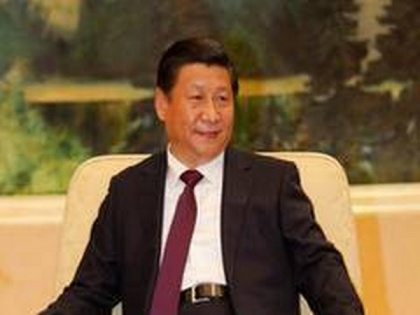Mass unemployment amid pandemic in China emerges as biggest challenge for CCP
By ANI | Published: August 3, 2020 11:55 AM2020-08-03T11:55:25+5:302020-08-03T12:10:01+5:30
China is witnessing worst economic shrinkage in decades due to sluggish domestic consumption and low export demand amid the pandemic. One of the fallouts of the slow economy is the loss of jobs.

Mass unemployment amid pandemic in China emerges as biggest challenge for CCP
China is witnessing worst economic shrinkage in decades due to sluggish domestic consumption and low export demand amid the pandemic. One of the fallouts of the slow economy is the loss of jobs.
Unemployment is exploding in the country with an estimated 70 to 80 million Chinese lost their jobs or were unable to work at the end of March, several weeks after the lockdown was lifted.
Officially, the urban unemployment rate stood at 6 per cent in April, compared with 5.2 per cent last December, a loss of some 4 million jobs. But this figure represents only a small part of the reality.
"The official survey does not take into account migrant workers, nor the situation in small and medium-sized enterprises and among the self-employed," says Hu Xingdou, an independent economist in Beijing.
According to a report, that estimated 70 to 80 million Chinese lost their jobs or were unable to work at the end of March, several weeks after the lockdown was lifted.
Another grim scenario is coming from China's export-related sectors that could shed up to 10 million jobs in the coming months due to the global recession and renewed trade tensions with the United States and other countries.
Although China's urban unemployment rate slipped to 5.7 per cent in June, 19.3 per cent of new graduates remained jobless, said in a report, adding the labour market continued to face challenges.
Around 300 million migrants who have left the countryside to seek work in cities are now the most vulnerable segment of the population in a developing and unprecedented economic and social crisis caused by the coronavirus epidemic.
Retail shops, wholesalers, restaurants, hotels -- all sectors that are intensive in low-skilled labour -- have closed down almost permanently or laid off their staff. At the end of April, a study by Zhongtai Securities, a brokerage firm based in Shandong province, estimated the real unemployment rate in China to be 20.5 per cent, with 70 million unemployed.
China did not announce a GDP growth target during the annual National People's Congress in May - an aberration since 1990. On April 17, China's National Bureau of Statistics announced that the country's economy had plunged to around 7 per cent in the first quarter of 2020 - the worst drop since the Cultural Revolution in 1976.
The Chinese Communist Party (CCP) acknowledged economic shrinkage for the first time in three decades.
The report was quickly removed from the internet and the research director was punished.
Even before the epidemic, Chinese growth was slowing down, limiting job creation. Aware of the difficulties, the Chinese government has only set itself the goal of stabilising the urban unemployment rate at around 6 per cent.
China's social safety net is not designed to compensate for mass unemployment. The CCP is aware of the risk that mass unemployment can spark political unrest and jeopardising the party's pledge of prosperity in return for unquestioned political power.
This social crisis comes at a worse time for President Xi Jinping, the Supreme Leader of the Communist Party, which celebrates its centennial next year. And this year, 2020, is also the target that the regime set itself for completely eradicating extreme poverty and doubling per capita GDP compared to 2010.
Faced with the ticking time bomb in form of mass unemployment a time when 8.7 million students are preparing to enter the job market, the crisis has created a major political challenge for the ruling power and threatens to break the "social contract" based on unfaltering political obedience in exchange for economic enrichment.
"To guarantee employment is to protect the people but also to protect political power," says Chen Daoyin, an independent political analyst and former professor in Shanghai. "As long as employment is maintained and basic food problems are solved, the stability of the regime is not threatened."
With just over 200 strikes since the beginning of the year (compared to more than 700 at the same time last year), according to the NGO China Labour Bulletin, Chinese workers are demonstrating even less than before. Anger and dissatisfaction are expressed in other ways, however -- particularly on social media, in proportions that are difficult to quantify.
"The fear of the epidemic, the confinement and reinforced control by authorities are not likely to favour social movements, but that doesn't mean that there isn't a social crisis," says Eric Sautede, Asia Correspondent for Planet Labor.
While global demand is collapsing, stabilising employment and limiting layoffs are also the best guarantee of reviving domestic consumption, on which the majority of Chinese growth is now based.
For the first time since Deng Xiaoping opened up China, real household disposable income fell by 3.5 per cent in the first quarter, while consumer spending fell by 12.5 per cent.
The fact is that the fiscal condition of the world's second-largest economy is in dire straits even before the pandemic struck.
The glitz and the swank that the ruling Communist Party propaganda machinery portrayed to the outside world is hollow and China's economic superpower image is an illusion. In reality, the economy has been one of China's major fault lines for some years now and employment bomb is waiting to explode any time soon.
( With inputs from ANI )
Open in app